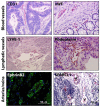Blood Vessel-Targeted Therapy in Colorectal Cancer: Current Strategies and Future Perspectives
- PMID: 38473252
- PMCID: PMC10930912
- DOI: 10.3390/cancers16050890
Blood Vessel-Targeted Therapy in Colorectal Cancer: Current Strategies and Future Perspectives
Abstract
The vasculature is a key player and regulatory component in the multicellular microenvironment of solid tumors and, consequently, a therapeutic target. In colorectal carcinoma (CRC), antiangiogenic treatment was approved almost 20 years ago, but there are still no valid predictors of response. In addition, treatment resistance has become a problem. Vascular heterogeneity and plasticity due to species-, organ-, and milieu-dependent phenotypic and functional differences of blood vascular cells reduced the hope of being able to apply a standard approach of antiangiogenic therapy to all patients. In addition, the pathological vasculature in CRC is characterized by heterogeneous perfusion, impaired barrier function, immunosuppressive endothelial cell anergy, and metabolic competition-induced microenvironmental stress. Only recently, angiocrine proteins have been identified that are specifically released from vascular cells and can regulate tumor initiation and progression in an autocrine and paracrine manner. In this review, we summarize the history and current strategies for applying antiangiogenic treatment and discuss the associated challenges and opportunities, including normalizing the tumor vasculature, modulating milieu-dependent vascular heterogeneity, and targeting functions of angiocrine proteins. These new strategies could open perspectives for future vascular-targeted and patient-tailored therapy selection in CRC.
Keywords: aflibercept; angiocrine; antiangiogenic treatment; bevacizumab; cancer; colorectal cancer; endothelial cells; fruquintinib; ramucirumab; regorafenib; tumor microenvironment; vascular heterogeneity; vasculature.
Conflict of interest statement
The authors declare no competing interests.
Figures


Similar articles
-
Targeting angiogenesis and tumor microenvironment in metastatic colorectal cancer: role of aflibercept.Gastroenterol Res Pract. 2014;2014:526178. doi: 10.1155/2014/526178. Epub 2014 Jul 21. Gastroenterol Res Pract. 2014. PMID: 25136356 Free PMC article. Review.
-
New advances in antiangiogenic combination therapeutic strategies for advanced non-small cell lung cancer.J Cancer Res Clin Oncol. 2020 Mar;146(3):631-645. doi: 10.1007/s00432-020-03129-6. Epub 2020 Feb 17. J Cancer Res Clin Oncol. 2020. PMID: 32065262 Review.
-
Sequencing of antiangiogenic agents in the treatment of metastatic colorectal cancer.Clin Colorectal Cancer. 2014 Sep;13(3):135-44. doi: 10.1016/j.clcc.2014.02.001. Epub 2014 Feb 27. Clin Colorectal Cancer. 2014. PMID: 24768040 Review.
-
Antiangiogenic Therapy in Colorectal Cancer.Cancer J. 2018 Jul/Aug;24(4):165-170. doi: 10.1097/PPO.0000000000000328. Cancer J. 2018. PMID: 30119079 Review.
-
The role of tumor angiogenesis as a therapeutic target in colorectal cancer.Expert Rev Anticancer Ther. 2018 Mar;18(3):251-266. doi: 10.1080/14737140.2018.1428092. Epub 2018 Jan 19. Expert Rev Anticancer Ther. 2018. PMID: 29338550 Free PMC article. Review.
Cited by
-
Recent Treatment Strategies and Molecular Pathways in Resistance Mechanisms of Antiangiogenic Therapies in Glioblastoma.Cancers (Basel). 2024 Aug 27;16(17):2975. doi: 10.3390/cancers16172975. Cancers (Basel). 2024. PMID: 39272834 Free PMC article. Review.
References
-
- World Health Organization Colorectal Cancer. 2023. [(accessed on 15 December 2023)]. Available online: https://www.who.int/news-room/fact-sheets/detail/colorectal-cancer.
-
- Ugai T., Sasamoto N., Lee H.-Y., Ando M., Song M., Tamimi R.M., Kawachi I., Campbell P.T., Giovannucci E.L., Weiderpass E., et al. Is early-onset cancer an emerging global epidemic? Current evidence and future implications. Nat. Rev. Clin. Oncol. 2022;19:656–673. doi: 10.1038/s41571-022-00672-8. - DOI - PMC - PubMed
-
- Cervantes A., Adam R., Roselló S., Arnold D., Normanno N., Taïeb J., Seligmann J., De Baere T., Osterlund P., Yoshino T., et al. Metastatic colorectal cancer: ESMO Clinical Practice Guideline for di-agnosis, treatment and follow-up. Ann. Oncol. 2022;34:10–32. doi: 10.1016/j.annonc.2022.10.003. - DOI - PubMed
Publication types
Grants and funding
- FOR 2438, subproject 2 (project ID 280163318) to EN/MS/Deutsche Forschungsgemeinschaft
- SFB/TRR 241, subproject A06 (project ID 375876048) to MS/Deutsche Forschungsgemeinschaft
- STU 238/10-1 (project ID 437201724) to MS/Deutsche Forschungsgemeinschaft
- TRR 305, subproject B08 (project ID 429280966) to EN/Deutsche Forschungsgemeinschaft
- DFG-NOTICE program (project ID 493624887) to EN and RG/Deutsche Forschungsgemeinschaft
LinkOut - more resources
Full Text Sources

